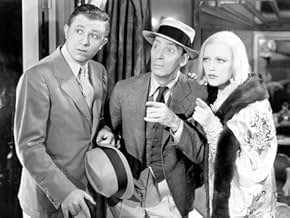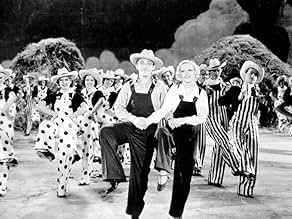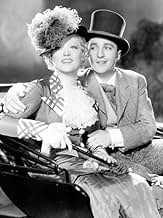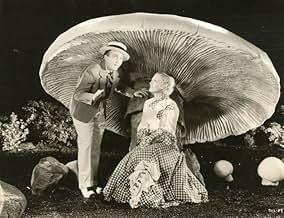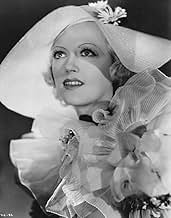A love-struck teacher pursues a radio singer to Hollywood.A love-struck teacher pursues a radio singer to Hollywood.A love-struck teacher pursues a radio singer to Hollywood.
- Director
- Writers
- Stars
- Awards
- 3 wins & 1 nomination total
The Radio Rogues
- The Radio Rogues
- (as Three Radio Rogues)
Sam Appel
- Mexican Bartender
- (uncredited)
Henry Armetta
- Henry Armetta
- (archive footage)
- (uncredited)
Eddie Bartell
- Member - Three Radio Rogues
- (uncredited)
Wallace Beery
- Wallace Beery - Premiere Clip
- (archive footage)
- (uncredited)
Clara Blandick
- Miss Perkins - Divinity Teacher
- (uncredited)
Harry Bowen
- Bartender
- (uncredited)
Nora Cecil
- Briarcroft's Teacher
- (uncredited)
Onest Conley
- Tap Dancer
- (uncredited)
Ken Darby
- Member - The King's Men
- (uncredited)
Jon Dodson
- Member - The King's Men
- (uncredited)
- Director
- Writers
- All cast & crew
- Production, box office & more at IMDbPro
Featured reviews
If you like to see the original crooner of all times and really the King of male singers. Bing was a great actor in this film along with super star Marion Davies, who was like the Marilyn Monroe during her days and even Jean Harlow. Marion Davies was also a long time friend of William Randolph Hearst, the newspaper magnet of California. Bing Crosby sings,"You were Temptation" and he must have charmed all the ladies hearts of those days. Wallace Berry, veteran actor has a brief role in this film and is uncredited along with the great Mae Clarke. This is really what Hollywood films were like in the Golden era of movies. It is a must view film.
Beautiful blonde French teacher Marion Davies (as Sylvia Bruce) quits her job to pursue radio crooner Bing Crosby (as Bill Williams) to Hollywood, where Mr. Crosby is going to star in a motion picture. In Los Angeles, Ms. Davies moves in with new pal Patsy Kelly (as Jill Barker), who thinks Davies could be a movie star "better than Norma Shearer." Good one. Davies continues to swoon over Crosby, who is only has eyes for French co-star Fifi D'Orsay (as Lili Yvonne). Which of the dueling damsels will win Crosby's heart?
A fine supporting cast, director (Raoul Walsh), and budget make this is a pleasant Bing Crosby musical masquerading as a Marion Davies movie. Two of Crosby's Brunswick 78 RPM recordings were hits: sung herein to Sterling Holloway, "Beautiful Girl" reached #11; the best film song "Temptation" went to #3; and, the big production number "We'll Make Hay While the Sun Shines" peaked at #8.
"Three Radio Rogues" singing impersonations are also highlights, with Jimmy Hollywood managing Kate Smith's "When the Moon Comes Over the Mountain" with uncanny ease. Mainly, though, it's Crosby's show.
***** Going Hollywood (12/22/33) Raoul Walsh ~ Bing Crosby, Marion Davies, Fifi D'Orsay, Patsy Kelly
A fine supporting cast, director (Raoul Walsh), and budget make this is a pleasant Bing Crosby musical masquerading as a Marion Davies movie. Two of Crosby's Brunswick 78 RPM recordings were hits: sung herein to Sterling Holloway, "Beautiful Girl" reached #11; the best film song "Temptation" went to #3; and, the big production number "We'll Make Hay While the Sun Shines" peaked at #8.
"Three Radio Rogues" singing impersonations are also highlights, with Jimmy Hollywood managing Kate Smith's "When the Moon Comes Over the Mountain" with uncanny ease. Mainly, though, it's Crosby's show.
***** Going Hollywood (12/22/33) Raoul Walsh ~ Bing Crosby, Marion Davies, Fifi D'Orsay, Patsy Kelly
Bing Crosby truly was the quintessential vocalist of his time. I strongly recommend Gary Giddins bio on Bing; an excellent reference.
Anyway, the story may be weak in this film, but the songs and Bing's clear baritone voice make up for it.
An interesting tidbit about this film: Of course Marion Davies was W.R. Hearst's mistress, and Hearst financed the film. Ms. Davies thus took full advantage of the situation by showing up for filming at 10 AM, shooting a scene or two before a four hour lunch replete with all the catered trimmings and wines. The day wound down by 4PM.
It's no wonder it took six months to shoot this film in an era when the typical film was shot in 2 weeks!
Anyway, the story may be weak in this film, but the songs and Bing's clear baritone voice make up for it.
An interesting tidbit about this film: Of course Marion Davies was W.R. Hearst's mistress, and Hearst financed the film. Ms. Davies thus took full advantage of the situation by showing up for filming at 10 AM, shooting a scene or two before a four hour lunch replete with all the catered trimmings and wines. The day wound down by 4PM.
It's no wonder it took six months to shoot this film in an era when the typical film was shot in 2 weeks!
Spirited young teacher leaves uptight girl's school for fame and fortune in Hollywood.
I tuned in to catch the legendary Marion Davies, WR Hearst's (Citizen Kane) favorite squeeze, and was generally impressed even though the movie is unexceptional. She's got some natural charisma, and can dance and act as well as most musical performers. So this is not a case of a rich Daddy Warbucks making a silk purse out of a no-talent.
The movie itself is expensively produced with a couple impressive dance numbers (e.g. the massed train station), plus a youthful Crosby crooning at his most tuneful. But except for the torchy Temptation, the selections themselves are pretty forgettable. Nonetheless, the many behind-the-scenes look at movie sets remains fascinating. At the same time, macho director Walsh and noir producer Wanger may seem odd choices for the production end of a musical, but this is still early in their respective careers.
Speaking of directors, Ned Sparks who plays the raspy director in the movie appears to have swallowed a lemon and followed it up with a load of sandpaper, providing much of the comedy relief, along with a young Patsy Kelly. But funnier than anyone without even trying is D'Orsay's cartoonish French siren. For cultural historians, there's the guy mimicking radio personalities of the day, making an informative and entertaining novelty act. But I can't help noticing a couple of Davies', shall we say, unusual costumes—one is so fancy, it looks like the crinoline is swallowing her, while the other resembles a big furry snow cone minus the snow. Good thing the rest of her wardrobe is 30's conventional.
All in all, it's a good glimpse back in time, even if the musical end lacks staying power.
I tuned in to catch the legendary Marion Davies, WR Hearst's (Citizen Kane) favorite squeeze, and was generally impressed even though the movie is unexceptional. She's got some natural charisma, and can dance and act as well as most musical performers. So this is not a case of a rich Daddy Warbucks making a silk purse out of a no-talent.
The movie itself is expensively produced with a couple impressive dance numbers (e.g. the massed train station), plus a youthful Crosby crooning at his most tuneful. But except for the torchy Temptation, the selections themselves are pretty forgettable. Nonetheless, the many behind-the-scenes look at movie sets remains fascinating. At the same time, macho director Walsh and noir producer Wanger may seem odd choices for the production end of a musical, but this is still early in their respective careers.
Speaking of directors, Ned Sparks who plays the raspy director in the movie appears to have swallowed a lemon and followed it up with a load of sandpaper, providing much of the comedy relief, along with a young Patsy Kelly. But funnier than anyone without even trying is D'Orsay's cartoonish French siren. For cultural historians, there's the guy mimicking radio personalities of the day, making an informative and entertaining novelty act. But I can't help noticing a couple of Davies', shall we say, unusual costumes—one is so fancy, it looks like the crinoline is swallowing her, while the other resembles a big furry snow cone minus the snow. Good thing the rest of her wardrobe is 30's conventional.
All in all, it's a good glimpse back in time, even if the musical end lacks staying power.
I watched this movie because I wanted to see what Marion Davies could do in a comedy, which is supposedly what she did best. She was an attractive woman, with - at least on screen - a pleasant, unpretentious personality, so I figured she might indeed do well in comedy.
But this script, by the much admired David Ogden Stewart, gives her nothing to work with. She delivers her lines ok, but the lines are so uninteresting that I don't know what Helen Hayes could have done with them.
Davies has to dance, and she's passable but no better. But then, no worse than Crawford or some other actresses of the era who were given dance numbers. Davies has to sing, and again, she's not bad, but nothing special.
In short, this movie doesn't make a case for Davies as an actress in comedy. It doesn't make her look bad, but it doesn't make you think she was a great comedian, either.
For me, the best thing, the only really good thing, in this movie was Bing Crosby's delivery of some of his musical numbers, in particular *Temptation*, a great song that he brings off very well. The other musical numbers, like the script, are bland and forgettable.
I'm surprised that Hearst, with all his money and power, couldn't have seen to it that Davies had better material. But then, perhaps the problem was not with her but with him: maybe he couldn't tell if a movie script was good or bad and imposed bad ones on her.
But this script, by the much admired David Ogden Stewart, gives her nothing to work with. She delivers her lines ok, but the lines are so uninteresting that I don't know what Helen Hayes could have done with them.
Davies has to dance, and she's passable but no better. But then, no worse than Crawford or some other actresses of the era who were given dance numbers. Davies has to sing, and again, she's not bad, but nothing special.
In short, this movie doesn't make a case for Davies as an actress in comedy. It doesn't make her look bad, but it doesn't make you think she was a great comedian, either.
For me, the best thing, the only really good thing, in this movie was Bing Crosby's delivery of some of his musical numbers, in particular *Temptation*, a great song that he brings off very well. The other musical numbers, like the script, are bland and forgettable.
I'm surprised that Hearst, with all his money and power, couldn't have seen to it that Davies had better material. But then, perhaps the problem was not with her but with him: maybe he couldn't tell if a movie script was good or bad and imposed bad ones on her.
Did you know
- TriviaWhen Marion Davies requested Bing Crosby as her leading man for this film, he was under contract to Paramount, where they had him starring in shorts and a series of college themed films with Jack Oakie. The success of this film moved Crosby into starring roles at Paramount with the likes of Carole Lombard and Miriam Hopkins, a definite step upwards.
- Quotes
Bill 'Billy' Williams: [singing] Out where they say, "Let us be gay," I'm going Hollywood. I'll ballyhoo greetings to you, I'm going Hollywood. Hey, while you sleepyheads are in that hay, I'll be dancing - I'm gonna be dancing with a sun-kissed baby. And I'm on my way - here's my beret, I'm going Hollywood!
- ConnectionsEdited into The Big Idea (1934)
- SoundtracksGoing Hollywood
(1933) (uncredited)
Music by Nacio Herb Brown
Lyrics by Arthur Freed
Played during the opening credits
Sung by Bing Crosby at the railroad station
Played as background music twice
Details
- Release date
- Country of origin
- Official site
- Languages
- Also known as
- Going Hollywood
- Filming locations
- Production companies
- See more company credits at IMDbPro
Box office
- Budget
- $914,000 (estimated)
- Runtime1 hour 18 minutes
- Color
- Aspect ratio
- 1.37 : 1
Contribute to this page
Suggest an edit or add missing content


